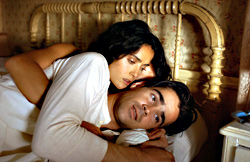Robert Towne’s career is a more heartbreaking romantic tragedy than even his greatest movie scripts (Chinatown, Shampoo, crucial parts of Bonnie and Clyde and The Godfather). I even loved the madness that was Personal Best, his unprofitable writing/directing debut. But after being a godfather of film’s golden ’70s, Towne helped Goldie Hawn destroy Jonathan Demme’s Swing Shift and aided travesties like Days of Thunder, Love Affair, and Mission: Impossible. (The funniest quote in film history is Tom Cruise trying to explain MI‘s incomprehensible plot to the L.A. Times.)
Even when he was great, Towne was fallible: He wanted Chinatown to end with Faye Dunaway getting away with her sister/daughter. So I was wary of him also directing his lifelong dream project, Ask the Dust, the 1930s L.A. story that piqued him into writing Chinatown. Towne pares down John Fante’s autobiographical cult novel into a melodrama about a tubercular Mexican waitress, Camilla Lopez (Salma Hayek), beloved by Italian-American aspiring novelist Arturo Bandini (Colin Farrell).
Though he’s the protégé of literary mandarin H.L. Mencken (unseen, and voiced by Time film critic Richard Schickel), Bandini can’t manage to write his L.A. opus, or even pay the rent his surly racist landlady (the smashing Eileen Atkins) demands. He runs into trouble when he tries to court Camilla. With the self-destructive irascibility that made Fante Charles Bukowski’s favorite writer, Bandini first gets her attention by pouring the bad coffee she’s just brought him all over the table, stalking out while she mops up the mess.
The mess is nothing compared to the love story it illogically incites. He insults her ethnic sandals. She switches to sexy shoes, saying her legs aren’t good enough to wear the shoes. “They’re not good enough for your legs,” he gallantly retorts. Presto, they’re skinny-dipping in Santa Monica, their irritability morphing inexplicably into passion. Then, bizarrely, he rebuffs Camilla, saving the Bandini weenie for a totally mystifying character (Rent‘s pretty/ugly Idina Menzel), who’s been physically scarred by love.
Dust is a shockingly inarticulate movie, despite voice-overs as gratuitous as they are dim-wittedly purple. When Bandini survives an earthquake, it’s supposed to mean something that the film can’t explain. Towne’s writing is hokey, and the line readings painfully arch. Besides the love story, he’s got a paper jam in his typewriter with larger themes of racism and L.A.’s lost innocence.
Here’s what’s great about the film: the ochre, aching period look achieved by cinematographer Caleb Deschanel and production designer Dennis Gassner (Barton Fink). Lovely shots combining real L.A. footage, period photos, and the spectacularly unspoiled South Africa location footage. The opening scene’s panorama that swoops into Bandini’s Barton Fink–ish bedroom is a high point. Robert Towne’s career since 1981’s Reds is the low point.








